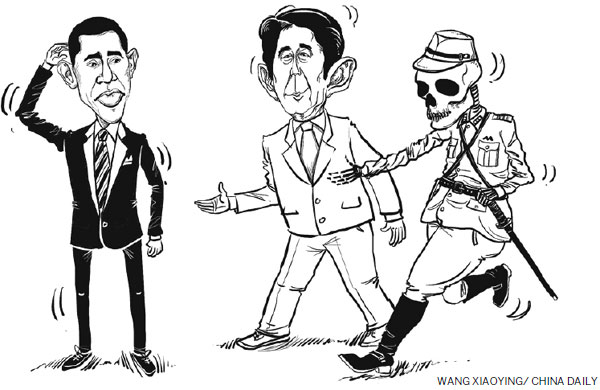On Oct 3, 2013, the White House announced that President Barack Obama had cancelled plans to attend the Asia-Pacific Economic Cooperation meeting because of the US government shutdown. Ever since the US administration had been crafting plans for Obama to visit Asia.
On Wednesday, Air Force One will land in Tokyo. Japan is the US president's first destination on an East Asian tour that will also take him to the Republic of Korea, the Philippines and Malaysia. Obama's trip has sparked discussions for obvious reasons. Most of the speculation focuses on his anticipated talks with Japanese Prime Minister Shinzo Abe. At the last moment, Obama's stay in Japan was extended to three days (from the originally planned two) with Tokyo announcing that he would visit as a state guest - an arrangement that means a lot photo-ops.
Trade will be high on Obama's agenda. The US administration had hoped to use October's APEC meeting to advance progress on the US-led trade initiative known as the Trans-Pacific Partnership. But few anticipated any sort of breakthrough in negotiations. Given the domestic situation in Japan and some other countries, forward movement was considered unlikely. This has not changed.

When Obama meets with Abe on April 24, the two leaders are expected to pledge to continue to pursue efforts to make the TPP a reality. But an agreement remains elusive - perhaps impossible. Japan's agricultural sector is among the most protected in the world. According to Organization for Economic Cooperation and Development estimates, Japan's farmers derive roughly half of their incomes from subsidies and price supports (compared with one-tenth in the US). Abe will argue that high import tariffs must be maintained on five "sacred" agricultural categories - rice, wheat, dairy, sugar, and beef and pork products.
Since no one expects a breakthrough in economic ties, attention has focused on the implications that Obama's visit might have on the US-Japan security relationship. Japan is considered by many as an "anchor" of American defense strategy in the Western Pacific. The US has more than 50,000 troops on the home islands and Okinawa, and Yokosuka serves as a headquarters for the Seventh Fleet. But Abe wants more.
High-ranking US officials have reassured Tokyo that, while Washington does not recognize Japanese sovereignty over the Diaoyu islands, Article 5 of the US-Japan security treaty commits America to the defense of territories "administered" by Japan, including the disputed islands in the East China Sea. According to Japanese media reports, Abe is hoping for an identical or stronger commitment from Obama. Some are dreaming of a more confrontational statement - perhaps a new foreign policy "doctrine" aimed at "containing" China. This is unlikely.
Although there is a good chance that Obama will use his visit to remind the world of the US' treaty obligations, it is almost certain that he will avoid provocative statements. He is more likely to employ "quiet diplomacy" to warn Abe that he is "part of the problem" in the Western Pacific. For example, after Abe's recent visit to the Yasukuni Shrine, which honors 14 Class-A war criminals, the US embassy in Tokyo issued a statement that said: "The United States is disappointed that Japan's leadership has taken an action that will exacerbate tensions with Japan's neighbors."
Moreover, some US lawmakers are urging Japan to unequivocally apologize for its wartime "comfort women" system. On Feb 5, 2014, US Assistant Secretary of State Daniel Russel praised the calls by some regional leaders to seek a peaceful and negotiated resolution to the dispute in the East China Sea. But the problem is that Abe does not even acknowledge that there is a dispute.
In sum, it appears that Obama's visit to Japan will not yield many dividends for any country. On the economic front, the US president's efforts to revive the troubled TPP negotiations are likely to fall flat. And on the security front, Abe will probably receive the customary statement about the value of the US-Japan security treaty - not the broader commitment he desires. Perhaps most disappointing is the likelihood of Obama being unable to convince Abe to adopt a more measured approach toward sensitive issues and thereby reduce tensions with Japan's neighbors.
The author is distinguished professor and director of the Graduate Program in Global Studies at Missouri State University, US.
